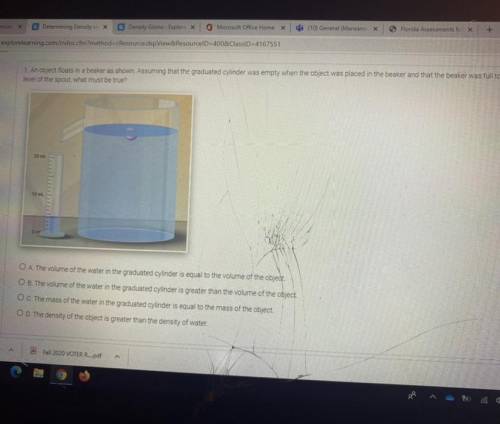
Physics, 05.10.2020 03:01 jpimentel2021
1. An object floats in a beaker as shown. Assuming that the graduated cylinder was empty when the object was placed in the beaker and that the beaker was full to the level of the spout, what must be true?
O A The volume of the water in the graduated cylinder is equal to the volume of the objedt.
O B. The volume of the water in the graduated cylinder is greater than the volume of the object.
OC The mass of the water in the graduated cylinder is equal to the mass of the object.
OD. The density of the object is greater than the density of water.


Answers: 1


Another question on Physics

Physics, 21.06.2019 18:40
Ten students stand in a circle and are told to make a transverse wave. what best describes the motion of the students? each student bumps the shoulder of his or her neighbor. at the exact time, all students take a step to the right. the students skip clockwise, going in a circular motion. one at a time, each student lifts his or her hands up and then down.
Answers: 1

Physics, 21.06.2019 23:30
Ablock of mass m = 2.5 kg is attached to a spring with spring constant k = 790 n/m. it is initially at rest on an inclined plane that is at an angle of 28 degrees with respect to the horizontal, and the coefficient of kinetic friction between the block and the plane is k = 0.14. in the initial position, where the spring is compressed by a distance of a = 0.18 m, the mass is at its lowest position and the spring is compressed the maximum amount. take the initial gravitational energy of the block as zero. b) if the spring pushes the block up the incline, what distance, l, in meters will the block travel before coming to rest? the spring remains attached to both the block and the fixed wall throughout its motion.
Answers: 1


Physics, 22.06.2019 12:00
Suppose a comet has an orbital period of 309.1 years around the sun. what is it’s average distance from the sun?
Answers: 1
You know the right answer?
1. An object floats in a beaker as shown. Assuming that the graduated cylinder was empty when the ob...
Questions










Mathematics, 18.03.2021 04:40



Mathematics, 18.03.2021 04:40


Mathematics, 18.03.2021 04:40

Mathematics, 18.03.2021 04:40



Mathematics, 18.03.2021 04:40

Mathematics, 18.03.2021 04:40



